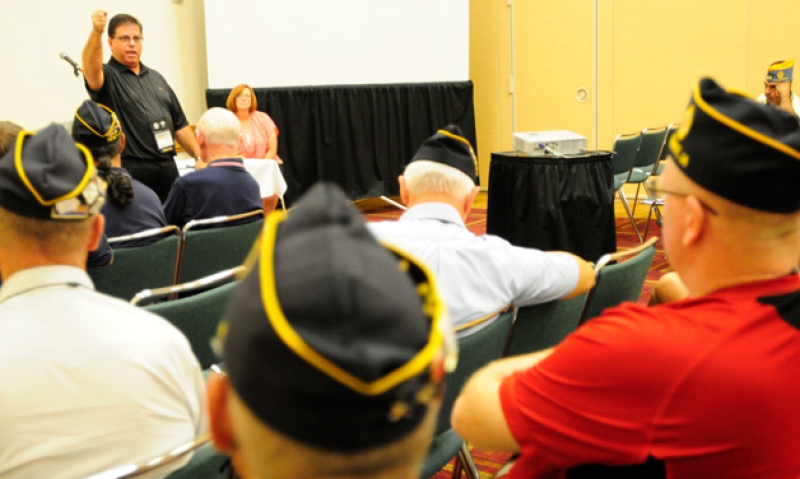
Ahead of Friday-evening competition, Legion color guards learn about scoring from the judge's perspective.
As The American Legion's 94th National Convention kicked off today at the Indiana Convention Center in downtown Indianapolis, a group of color guard competitors gathered in a conference room to learn how to read the scoring sheets they receive after each performance and apply that to future performances for higher scores.
This is the third such clinic put on by judges of the Legion's national color guard (and band) contests, held each year at national convention. The facilitators were David Priester, head judge; Tracey Bullard, assistant head judge; and judges Dan and Jill Strangis. They focused on the more precise, technical and perfectible aspects of a color guard performance: movement, equipment and execution. On one sheet, participating guards can be docked points for anything from not being the same distance apart from each other, to not being in sync with footfalls; on another, they gain points for military bearing, pivots, etc. But it isn't all tick by tick - the judges also take mitigating factors into account, such as the difficulty of the performance.
The main goal of the clinics is to show competitors that the judges work hard at judging well: "This is your big thing, and we don't take it lightly," Dan Strangis said. They gave advice on how guards can use feedback to improve both practices and performances by making use of videotaping to watch themselves in action; playing to strengths by cutting back on elements that seem to be a recurring problem; and gearing practices toward the program, rather than the endless repetition of fundamentals. Strangis encouraged the attendees to "build a culture ... of expectation" that things will be done right.
The clinics are just a part of the plans the judges have for the future. "We want to keep the communication ties a lot closer," Priester commented. He is developing a quarterly/as-needed e-newsletter for color guards, and wants to build out the contest's presence on the national website. And in addition to keeping current guards close, everyone is trying to increase the numbers. The secondary goal of the clinics is to entice those who might be interested in competing. It seems to have worked - Priester referred to an attending group from the Department of Florida that is preparing for the 95th National Convention in Houston in 2013, and added that "some [former guards] are looking at coming back."
Moving from its recent Saturday-afternoon slot, the Color Guard Contest will be held today at 5 p.m., reportedly its original time. The contest will be streamed live on www.legion.org, and will be available on demand after that at www.legiontv.org. The move was made in the hopes that it will lead to increased attendance, which may lead to increased participation down the road. Bullard's message to a post on the fence about starting a new program? "It's not as difficult as they think it is."
- Convention

